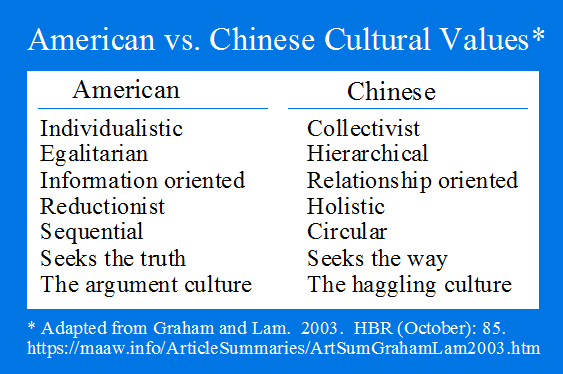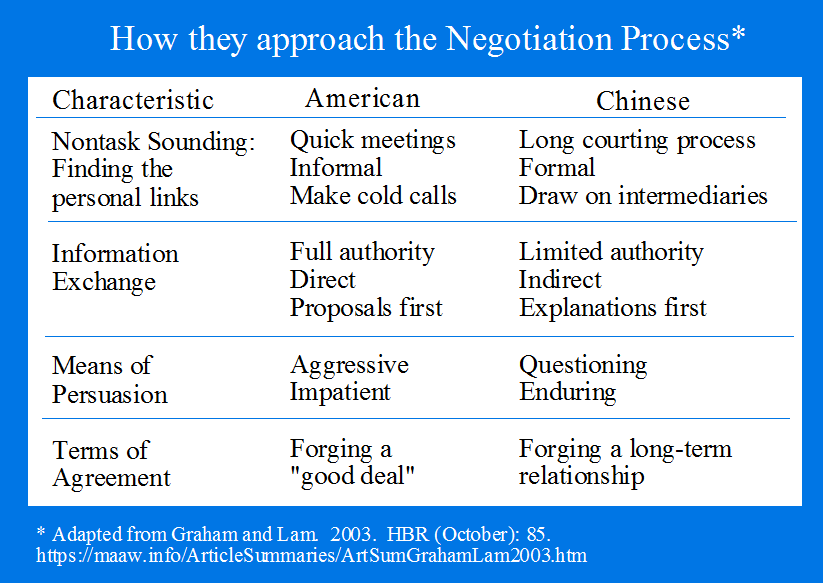
Summary by James R. Martin, Ph.D., CMA
Professor Emeritus, University of South Florida
Chinese Accounting & Management Main Page | International Aspects Main Page
The purpose of this article is to compare and contrast the American and Chinese cultures to help Western and Chinese negotiators learn to work together more efficiently. First, the authors discuss four threads related to the roots of Chinese culture. This is followed by a description of eight elements of Chinese negotiation style and some recommendations for American negotiators.
The Roots of Chinese Culture
According to Graham and Lam there are four thick threads of Chinese culture. These include:
Agrarianism - Two thirds of the Chinese people live in rural areas laboring in rice or wheat cultivation. The social environment is communal, not individualistic, and survival depends on cooperation and harmony. In Chinese history, agriculture is the "root" and commerce is the "branch". Historically, merchants were viewed as less important and looked down upon.
Morality - The Chinese concept of morality is based on what Confucius defined as five cardinal relationships between ruler and ruled, husband and wife, parents and children, older and younger brothers, and friend and friend. The first four are hierarchical and the ruled, wives, children, and younger brothers are to be obedient and loyal in return for the benevolent treatment of their rulers, husbands, parents, and older brothers. Taoism, based on the notions of Lao Tsu involves a compromise between the yin (feminine, passive) and yang (masculine, active), two forces that together form "the way", or the key to life. These underlying concepts are reflected in the way Chinese negotiators view the long haggling process as the best way to reach a compromise agreement.
The Chinese Pictographic Language - In Chinese, words are pictures that reflect a holistic view of information. In relation to the negotiation process, this helps explain how the Chinese negotiators view a potential business deal as a whole, rather than as a collection of issues.
Wariness of Foreigners - The Chinese are cynical about the rule of law and rules in general, and only trust their families and their bank accounts.

Eight Elements of Chinese Negotiation Style
Personal Connections (Guanxi) - An individual's social capital is a key in business negotiations and includes their relationships with friends, relatives and close associates. Good guanxi depends on a strict system of long-term reciprocity which cannot be ignored. Ignoring reciprocity is viewed as immoral.
The Intermediary (Zhongjian Ren) - To overcome the suspicion and distrust of foreigners and successfully negotiate with the Chinese you must establish a relationship with the organization through an intermediary. The first step is to find the personal links to your target organization (referred to as nontask sounding). The links must be based on personal experience, perhaps with a former classmate, but a Chinese go-between is indispensable since only a native Chinese speaker can understand the moods and body language of Chinese negotiators. The intermediary, not the negotiator brings up the issue to be discussed and can settle differences that could not otherwise be resolved.
Social Status (Shehui Dengji) - Because of the underlying Confucian hierarchical values of obedience and loyalty, casual or informal relationships are not viewed as appropriate in Chinese business dealings. To get to the negotiation stage may require a high level meeting of equals and the Chinese tend to feel insulted if confronted by a lower level representative. For the Chinese, the purpose of the initial meetings is to evaluate the relationship and the sincerity of the Western organization, not to begin the negotiation process. Whom a company sends to these meetings is a key to establishing a workable relationship.
Interpersonal Harmony (Renji Hexie) - In China, nontask soundings may take weeks or months, including home visits, invitations to sporting events, and long expensive dinners. Any attempt to do business without establishing renji hexie is rude. To Chinese negotiators, trust, harmony and good faith are more important than tightly drafted legal agreements.
Holistic Thinking (Zhengti Guannian) - Although Americans tend to think sequentially, negotiating one issue at a time, Chinese negotiators discuss all the issues simultaneously in what may appear to Americans to be a haphazard approach. However, to the Chinese nothing is settled until everything is settled.
Thrift (Jiejian) - According to market research, the Chinese save nearly four times as much as Americans. This underlying concept of thrift is reflected in how Chinese negotiators haggle over price. Their initial price, counteroffers, and negotiating tactics of silence and patience can seem unreasonable, but Western negotiators should expect these tactics. The authors' advice is to learn to haggle by asking questions related to their pricing logic including specifics such as delivery schedules and warranty terms. Haggling can take time, but pays off.
Face or Social Capital (Mianzi) - Face or social capital defines a person's place in their social network and is the measure of their reputation, social standing, or social worth. Face can be reduced or taken away by embarrassment or loss of composure, so it is very important not to cause a negotiator to lose face. To show anger, frustration, or aggression at the negotiation table is to cause a mutual loss of face, and will have a disastrous effect on the negotiation.
Endurance, Relentlessness, or Eating Bitterness and Enduring Labor (Chiku Nailao) - This element relates to the Chinese work ethic where endurance and relentlessness are viewed as more important than talent as the keys to success. For example, Chinese children attend school 251 days per year versus 180 days for American children. The Chinese will spend more time preparing for negotiations than Americans and expect longer bargaining sessions.
Recommendations include:
1. Ask a lot of questions and ask the same questions more than once. This shows endurance and helps expose weaknesses in the other sides position.
2. Show endurance by carefully researching the issues and then educating the Chinese about the issues and your company's position.
3. Show patience by carefully reconsidering each concession recognizing that the Chinese rarely make concessions following appeals without a period of consultation, group decision making, and the intentional delay tactic.

The future seems bright for the new Sino-Western business class. Chinese business schools are sprouting up all over mainland China and their students are learning about Western business concepts such as corporate image, brand equity, and intellectual property. To do business with China, Westerners need to learn the rules, develop the necessary personal connections and patience. Establishing business relationships with China need to be developed over a long period of time, but are likely to produce a considerable payoff in the future.
___________________________________________
Related summaries:
Chow, C. W., F. J. Deng and J. L. Ho. 2000. The openness of knowledge sharing within organizations: A comparative study of the United States and The People's Republic of China. Journal of Management Accounting Research (12): 65-95. (Summary).
Chow, C. W., Y. Kato and K. A. Merchant. 1996. The use of organizational controls and their effects on data manipulation and management myopia: A Japan vs. U.S. comparison. Accounting, Organizations and Society 21(2-3): 175-192. (Summary).
Cohen, J. R., L. W. Pant and D. J. Sharp. 1993. Culture-based ethical conflicts confronting multinational accounting firms. Accounting Horizons (September): 1-13. (Note).
Cushing, B. E., editor. 1987. Accounting and Culture: Plenary Session Papers and Discussants' Comments from the 1986 Annual Meeting of the American Accounting Association. American Accounting Association. (Summary).
Ignatius, A. 2021. "Americans don't know how capitalist China is." Harvard Business Review (May/June): 61-63. (Summary).
O'Clock, P. and K. Devine. 2003. The role of strategy and culture in the performance evaluation of international strategic business units. Management Accounting Quarterly (Winter): 18-26. (Summary).
Martin, J. R., W. K. Schelb, R. C. Snyder, and J. C. Sparling. 1992. Comparing the practices of U.S. and Japanese companies: The implications for management accounting. Journal of Cost Management (Spring): 6-14. (Summary).
Milanovic, B. 2019. Capitalism, Alone: The Future of the System That Rules the World. Harvard University Press. (Summary).
Mitter, R. and E. Johnson. 2021. What the West gets wrong about China: The fundamental misconceptions. Harvard Business Review (May/June): 42-48. (Summary).
Shields, M. D., and S. M. Young. 1989. A behavioral model for implementing cost management systems. Journal of Cost Management (Winter): 17-27. (Summary).
Thurow, L. C. 1996. The Future of Capitalism: How Today's Economic Forces Shape Tomorrow's World. Chapter 3: The End of Communism. William Morrow and Company. (Summary).